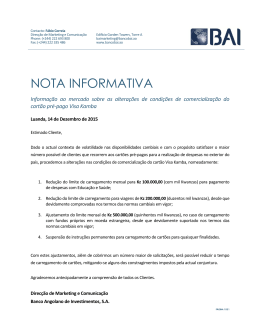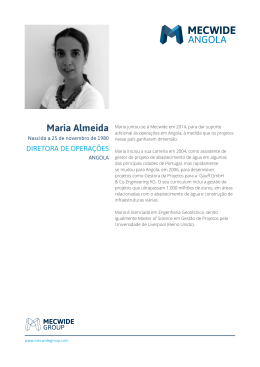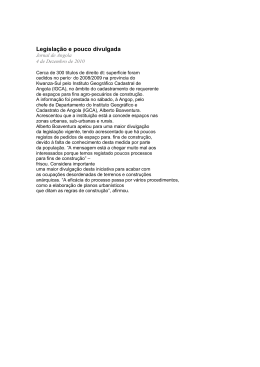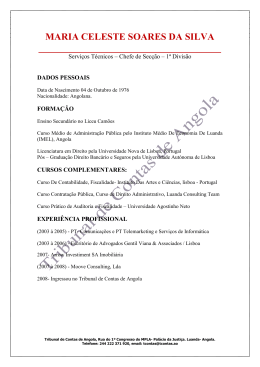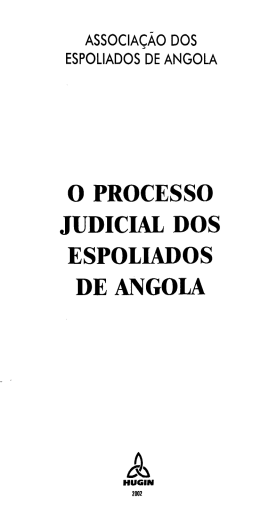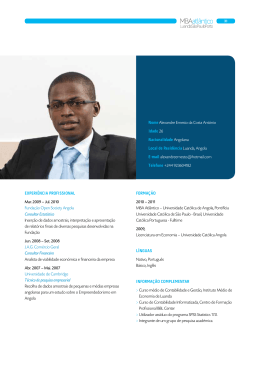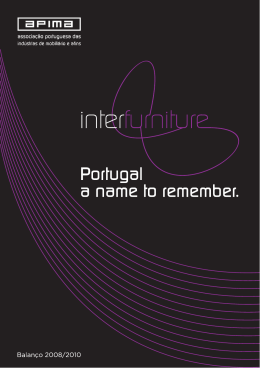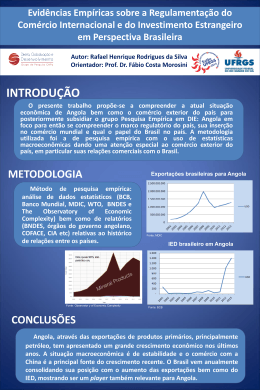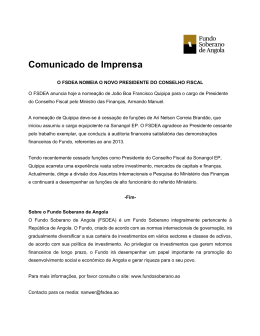Breves Aprender com o meu amigo Pl aying the Learning Game O projeto One-Laptop-Per-Child é um sucesso comprovado The One-Laptop-Per-Child project has proved to be a great success Em 2011, as escolas Dom Bosco foram selecionadas pela African Innovation Foundation para acolher a iniciativa de Nicholas Negroponte, One-Laptop-Per-Child Project, em Angola. Como a avaliação tem sido muito positiva, em 2014 o financiamento do projeto foi assumido pelo Fundo Soberano de Angola (FSDEA), estando assegurada a compra de mais 1400 portáteis e o lançamento da iniciativa em Calulu (Kwanza-Sul). Os primeiros 100 Kamba Dyami (KD) começaram por ser distribuídos em duas escolas – Sambizanga e Cazenga – e, nesses dias, não há aluno que fique doente ou faça piada às aulas. Kamba Dyami é o “meu amigo”, em Kimbundu, uma das lín- In 2011, the African Innovation Foundation (AIF) selected the Dom Bosco schools as the recipients of the One-Laptop-PerChild (OLPC) initiative, launched by Nicholas Negroponte, in Angola. In 2014, the project got financed by the Sovereign Fund of Angola and with this backing 1,400 more handhelds were purchased and enabling the initiative to launch in Calulu (South Kwanza). The programme began by putting the first 100 Kamba Dyami into two schools, one in Sambizanga, the other in Cazenga. And on these days, no student takes the day off sick or plays hookey. Kamba Dyami means “my friend” in Kimbundu, one of Angola’s official languages. It is also the name of the 12 guas nacionais angolanas, e é também o pequeno portátil verde através do qual centenas de crianças desfavorecidas têm o primeiro contacto com as novas tecnologias. “O Kamba Dyami deixa os alunos muito motivados”, relata Andreia Baltazar, coordenadora pedagógica do Projeto Kamba Dyami (PKD), no complexo escolar Dom Bosco, Luanda. Rapidamente aprendem a abrir, a ligar, a desligar e a utilizar algumas das funcionalidades e das atividades propostas por este portátil concebido para ser acessível a todas as idades. Aliás, o maior desafio para os professores é acompanhar o ritmo dos seus alunos. Com jogos e atividades interativas, os alunos utilizam o KD para consolidar o que aprenderam em Português e Matemática e também nas restantes disciplinas. O KD funciona em open source e sem fios, facilitando o acompanhamento de colegas e professores. Segundo a coordenadora, a adaptação e a “contextualização dos conteúdos foram o maior problema”, embora, no início, a falta de preparação dos professores tenha obrigado à contratação de técnicos oriundos do Brasil e do Uruguai, onde já havia experiência neste tipo de projeto. Atualmente, o estabelecimento de parcerias internacionais é equacionado como solução para o futuro, designadamente na formação de programadores do sistema Linux para a criação das diversas atividades do Kamba Dyami. Mas os docentes angolanos já descobriram como contornar alguns dos obstáculos: “Encontrámos um software livre que permite criar conteúdos e vamos começar a utilizá-lo”, anuncia Andreia Baltazar, acrescentando que também já conseguiram escrever o primeiro manual do KD em português. Mas o plano é expandir, servindo o sucesso do PKD nas escolas-piloto como incentivo para massificar a iniciativa a nível nacional. 1.636 alunos já estudam com um Kamba Dyami students already study with a Kamba Dyami 800 portáteis Kamba Dyami distribuídos em dois anos handheld Kamba Dyami have been distributed in two years 43 professores participam no Projeto Kamba Dyami teachers participated in the Project Kamba Dyami 1.400 portáteis estão assegurados pelo Fundo Soberano de Angola handhelds are insured by the Sovereign Fund of Angola 4 províncias para replicação do PKD: Bengo, Kwanza Norte, Kwanza-Sul e Benguela provinces are eligible for the PKD initiative: Bengo, North Kwanza, South Kwanza and Benguela small, green handheld computer that has given hundreds of underprivileged children in Angola their very first contact with technology. “The Kamba Dyami makes the students very motivated,” says Andreia Baltazar, education coordinator of Project Kamba Dyami (PKD) at the Dom Bosco schools. They are quick to get to grips with the device – learning how to open it, turn it on and off and, most importantly, use its many activities. The challenge for the instructors, however, is to keep up with student progress. “The students end up overtaking the teacher,” she explains. “The KD uses a language designed for children so they end up teaching themselves.” With games and interactive activities, the students use the KD firstly to learn Portuguese and mathematics before slowly including their other subjects. The KD is also wireless and easier for the children to use whether on their own or working together. The most challenging part of deploying the technology was adapting it to suit the needs of Angolan schools. There was also the problem of a lack of qualified teachers. Experts from Brazil and Uruguay were brought in and, with help from Linux administrators with Python programming experience, suitable software was created for the Angolan Kamba Dyami activities. However, the Angolan teachers managed to solve some of the problems themselves: “We found free software that allowed us to create the content we need, then use it immediately,” explained Andreia Baltazar. Even better, the teachers have already succeeded in writing the first KD manual in Portuguese. Using the success of PKD in these schools, the plan now is to expand the project and attract media attention at the national level. O FSDEA lança Escola Hoteleira FSDEA launching Hotel School A indústria hoteleira africana está pronta para uma dinâmica de crescimento. O FSDEA reconhece o papel que pode desempenhar, como motor, na criação de receitas, no setor de serviços angolano. Todavia, para competir globalmente precisamos de uma força de trabalho muito qualificada e eficiente, de modo a ter serviços nos padrões internacionais. Assim, o Fundo está a lançar uma escola hoteleira que permita aos jovens angolanos obter conhecimentos desta indústria. A escola desempenhará um papel crucial como catalisador na criação de oportunidades de emprego e empreendedorismo, além de apoiar a melhoria do setor de serviços nacionais nos próximos anos. The African hotel industry is poised for buoyant growth. The FSDEA also recognizes the role it can play as a key driver for revenue generation in the service sector of our country. However, to compete on the global arena we need a fully qualified and highly efficient workforce to deliver services at the international standards. Therefore, the Fund is launching a hospitality school to equip Angola’s youth with industry level hospitality know-how. The school will play a crucial role as a catalyst in creation of employment and entrepreneurship opportunities, in addition to supporting the improvement of the domestic service sector in the coming years. 13
Download
